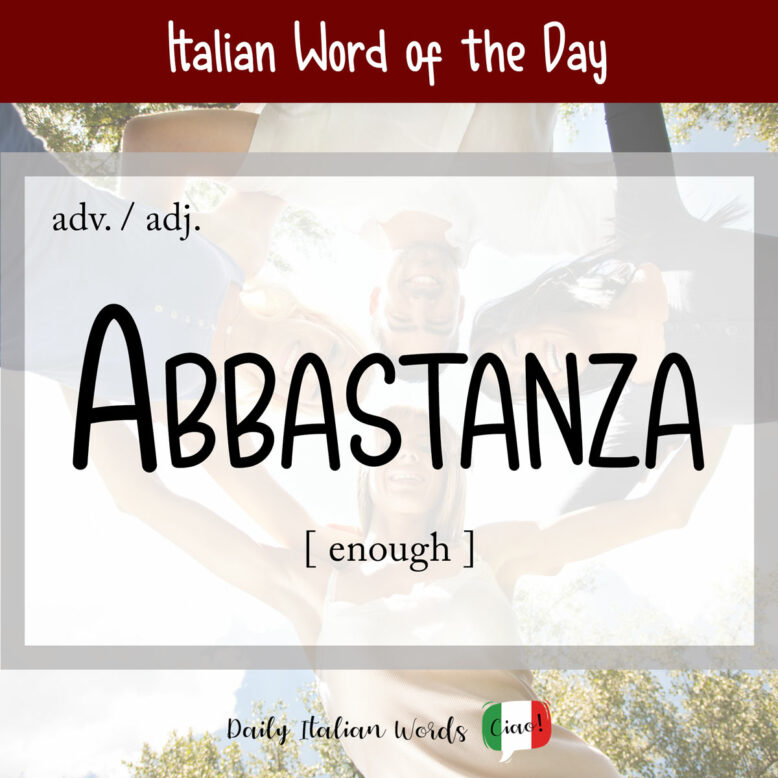A handy word you will find yourself using all the time in Italian is abbastanza. It comes from the ancient form a (to) + bastanza (an antiquated derivative of bastare = to suffice). The doubling of the letter b can be attributed to a linguistic phenomenon called syntactic gemination.

There are two predominant translations for abbastanza. The first is enough and the second is fairly / quite / pretty / rather / etc.
Abbastanza as ‘enough’
When it follows a verb, abbastanza always translates as enough.
Hai mangiato abbastanza? Vuoi un po’ di frutta?
Have you eaten enough? Do you want some fruit?
It also means enough when it is used as an adjective that modifies a noun.
Non abbiamo abbastanza tempo.
We don’t have enough time.

Abbastanza can also modify adjectives, in which case is often followed by a subordinate clause introduced by the prepositions da or per:
Il tempo mi sembra abbastanza buono per fare una passeggiata.
The weather seems good enough to go on a walk.
Non è forte abbastanza da ammettere la verità.
He’s not strong enough to admit the truth.

Finally we have the expression averne abbastanza (to have enough of) which is often used when a person has reached his or her limit and is unwilling to tolerate any more of something undesirable.
Ne ho abbastanza di lei e delle sue lamentele!
I’ve had enough of her and her complaints!
Abbastanza as ‘fairly, pretty, quite, rather’
Abbastanza can also function as an adverb that means ‘to a moderately high degree’. In this sense, some possible English translations include fairly, pretty, quite and rather. It appears in front of both adverbs and adjectives as you can see below.
Adverbs:
- abbastanza velocemente = fairly quickly
- abbastanza lentamente = quite slowly
- abbastanza bene = quite well
Adjectives:
- abbastanza caro = fairly expensive
- abbastanza intelligente = pretty intelligent
- abbastanza interessante = quite interesting
- abbastanza stupido = rather stupid
Il caffè è abbastanza forte.
The coffee is quite strong.
The importance of surrounding context
Sometimes it is the context of the conversation that determines whether enough or quite is the best translation.
To show you what we mean, let’s take a look at the last example phrase above: Il caffè è abbastanza forte.
The first translation for abbastanza that comes to mind, without any surrounding context, is quite. The speaker is simply describing the state of the coffee (i.e. it is strong but not overwhelmingly strong).

However, imagine that your partner comes downstairs early in the morning and, noticing that you look very tired, decides to make you a cup of coffee. They might ask:
È abbastanza forte il caffè?
Is the coffee strong enough?
To which you would reply:
Sì, il caffè è abbastanza forte.
Yes, the coffee is strong enough.
In this case, the implication is that the coffee is strong enough to fulfil a purpose. Indeed, the response could have included an unspoken subordinate clause such as da svegliarmi (to wake me up) or per i miei gusti (for my tastes):
Il caffè è abbastanza forte da svegliarmi.
The coffee is strong enough to wake me up.
Il caffè è abbastanza forte per i miei gusti.
The coffee is strong enough for my tastes.
In short, if you’re struggling to find the right translation, remember that the context can often be the key.
Heather Broster is a graduate with honours in linguistics from the University of Western Ontario. She is an aspiring polyglot, proficient in English and Italian, as well as Japanese, Welsh, and French to varying degrees of fluency. Originally from Toronto, Heather has resided in various countries, notably Italy for a period of six years. Her primary focus lies in the fields of language acquisition, education, and bilingual instruction.


